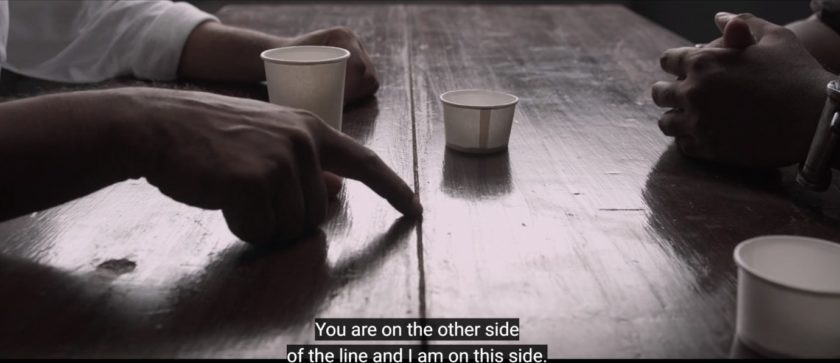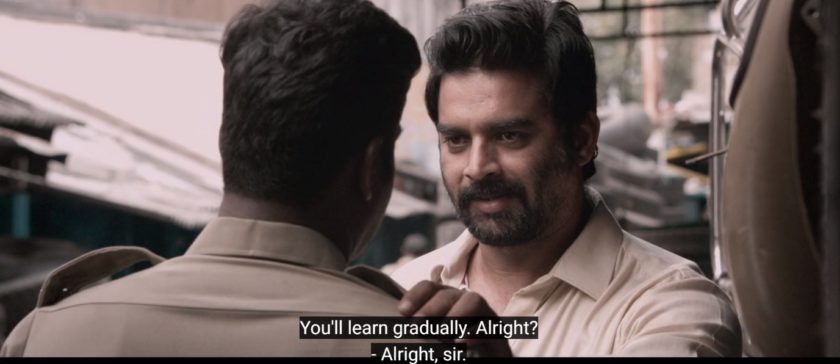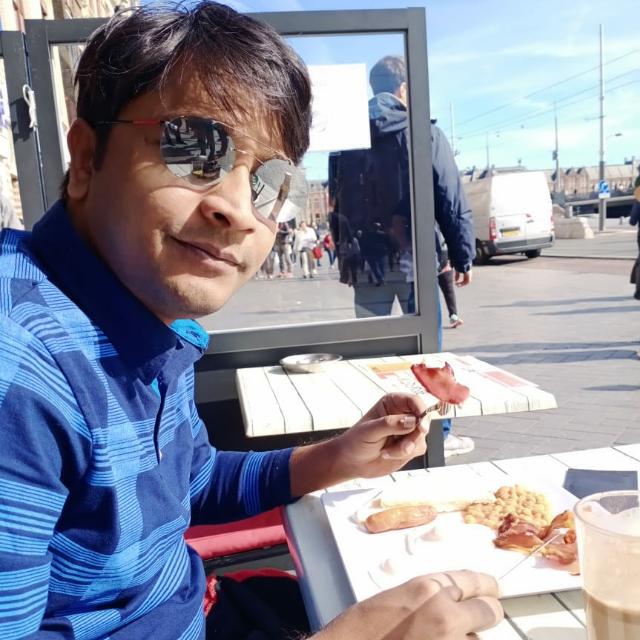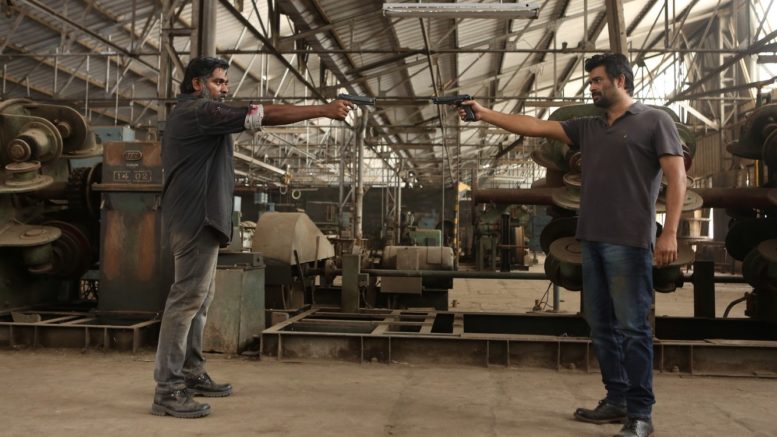Two fundamental elements have fueled humanity’s progress throughout history – storytelling and questioning. Long before the advent of record-keeping techniques, storytelling served as the primary method of passing knowledge across generations. The quintessential W’s (Who, what, where, when, and why) propelled humans from the obscurity of caves to the brilliance of well-lit skyscrapers. In Vikram Vedha, these two narrative tropes intertwine skillfully to craft a captivating story.
“Oru kadha sollata sir (Shall I tell you a story, sir)?” queries Vedha (Vijay Setupathi), the wanted fugitive, to Vikram (R. Madhavan), the cop. What ensues is the dismantling of the foundational beliefs that Vikram holds dear. It mirrors a nuanced retelling of the Vikraam-Betaal folklore. Much like the ancient tale, this film revolves around the ‘stories’ narrated by Vedha and the answers sought by Vikram.

The interrogation Scene- Lines are drawn(?)
When Vikram and Vedha cross paths for the first time, the film carefully unfolds Vikram’s backstory. We learn about his role as an encounter cop, his teammates, his love story, his fondness for bikes and scotch, and, most significantly, his deeply ingrained beliefs. In contrast, Vedha remains an enigma, a ‘ghost’ constructed from hearsay.
The film primes us to anticipate a ruthless villain, a notion heightened by Vedha’s brilliantly executed ‘surrender’ scene. This surrender bears resemblance to Raymond Reddington’s pivotal moment in the highly acclaimed TV show, Blacklist. As they eventually confront each other from opposite ends of the interrogation room, the lines are unmistakably drawn. A cop stands against a criminal, the forces of good and evil, one clad in white, the other in black. Vikram explicitly demarcates this line at the onset of the interrogation: ‘Indha pakkam naan, andha pakkam nee’ (‘I am on this side, and you are on that side’).

That is when the tables metaphorically turn, for it is not Vikram who is asking the questions but Vedha. Each of Vedha’s stories and the follow up question is a pound of hammer on the foundation of Vikram’s beliefs.
Belief Number 1: There are no in-betweens.
Vikram inherits this life lesson from his father. A simplistic way of looking at things, in black and white, right, and wrong, criminals and cops – the last one becomes his chosen profession. It does not matter that his father himself was a digression to this rule. A good police officer who would take the corporal punishment at home little too seriously. Vedha is Vikram’s introduction to the world of in-betweens. Tinges of grey start appearing on the colour palette. The line starts to blur.

Belief 2: Ability to identify a criminal
The belief that one can discern a criminal merely by looking into their eyes is Vikram’s nightly lullaby, providing him with a false sense of peace. Despite engaging in extrajudicial killings, Vikram rationalizes these actions with a sense of pride, passing down the legacy to new team members. Paradoxically, he remains oblivious to the ‘criminals’ within his own circle. Even Simon’s confession during the ‘sins of the father’ speech fails to alert Vikram to the sins committed by those close to him. Vedha aptly describes Vikram as a ‘horse with blinders,’ towing his ‘station’ wagon without questioning the actions of his fellow officers. For a cop tasked with finding clues, Vikram turns a blind eye to the transgressions of his colleagues.
Challenging Beliefs: Vikram’s Wake-Up Call
Vedha’s stories act as a catalyst, unraveling the flaws in Vikram’s steadfast belief. Responding to Vedha’s second question, Vikram unintentionally concludes that ‘Puli is innocent.’ What eluded him in Puli’s eyes, Simon understood, leading to his hesitation. Eyes could unveil everything if only they were questioned. Vikram’s narrow vision begins to broaden, discerning shades of grey within the visible spectrum.
Piggybacking on Vikram, Vedha guides him through a convoluted maze where cops and criminals transcend the binary of good or bad, operating as players in a profit-driven game. The demarcation line dissipates, and beneath the black or white exterior, there emerges the predator and the prey. Vikram must navigate this intricate web to determine who is who, lest he drown in a sea of unanswered questions. The folklore interwoven with the standard criminal-cop drama adds an intriguing layer to the narrative, placing the film in the ambiguous territory between good and excellent.

Captive of the 24 frames and admirer of the written word. If it is not on the silver screen or on the pages of a paperback, it might as well not exist.


Be the first to comment on "Vikram Vedha: In-between lies the rub"